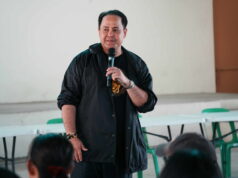CLARK FREEPORT – The chairman of the House Committee on Information and Communications Technology (ICT) said here yesterday that a legislation could be an alternative to block the country’s Internet system access to the new domain .xxx for explicitly pornographic websites.
In an interview with Punto during the first Clark International ICT Conference and Expo here, Taguig Rep. Freddie Tinga said it would be easy to pass a legislation once the .xxx sponsored top-level domain (s-TLD) finally takes off and loads the internet with explicit pornography and would be “generally available” starting this December.
The move for the TLD was made by the International Foundation for Online Responsibility (IFFOR). Last March 18, the board of the Internet Corporation for Assigned Names and Numbers (ICANN) approved the .xxx s-TLD.
The vote was 9 in favor, 4 against, with 3 abstentions.
ICANN, established in 1998, is a non-profit corporation based in Marina del Rey in California to oversee Internet-related tasks formerly performed directly by other groups on behalf of the US government. Much of its work revolved around the introduction of new generic TLD’s.
While Tinga said that coming out with legislation barring the .xxx domain in the Philippines, he admitted that such a proposal could be controversial.
“In such cases, there has always been the question of who would be the censor and there the borderline is drawn between pornography and art,” he said.
Tinga said, however, that in the Philippines, Internet pornography has been overshadowed by social networking.
“If there is something more interesting (than pornography) in the Internet, that is where people tend to gravitate,” he noted.
He also said, however, that even if the .xxx domain is banned by law in the country, sectors involved in pornography would remain in the local Internet.
The ICANN reported that the .xxx TLD was merely a “voluntary option for pornographic sites in the Internet as a “tool for dealing with the conflict between those who wish to provide and access such material through the Internet, and those who wish to prevent access to it, either by children and adolescents or by employees at their workplaces.”
Advocates of the domain said it would be easier for parents and employers to block the entire pornography TLD, rather than using more complex and error-prone content-based filtering, without imposing any restrictions on those who wish to access it.
Critics, however, said that the move would not curtail pornography in the Internet since using the TLD was merely voluntary.
The blocking of websites is done in other countries, notably in China where the Chinese government had blocked a Norwegian website due to the awarding of the 2010 Nobel Peace Price to Chinese human rights activist Liu Xiaobo.
Also blocked in China are the websites of the United Nations, the Huffington Post, Facebook, Twitter, YouTube, among other sites popular in other countries.



